For this year's South-West regional special CM decided to concentrate
Page 45
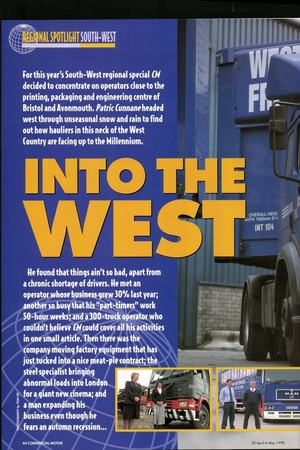
Page 47
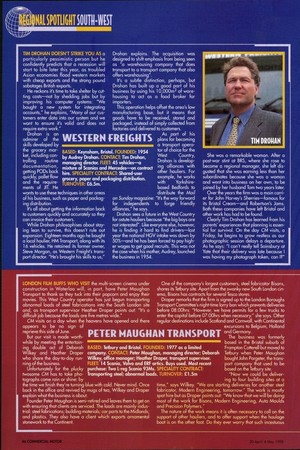
Page 48
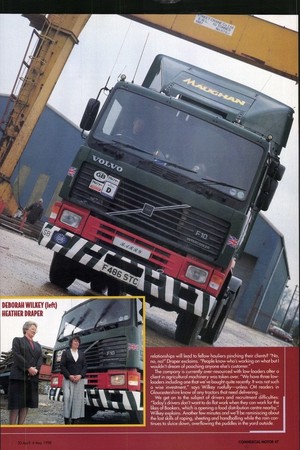
Page 49
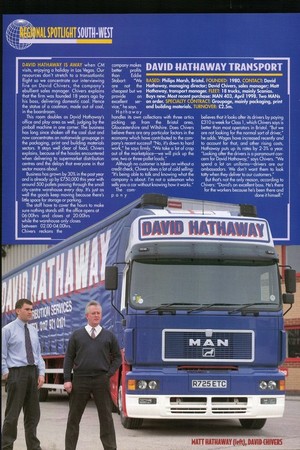
Page 50
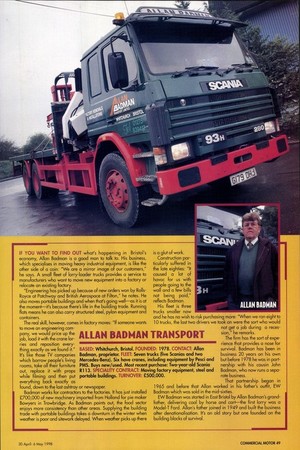
Page 51
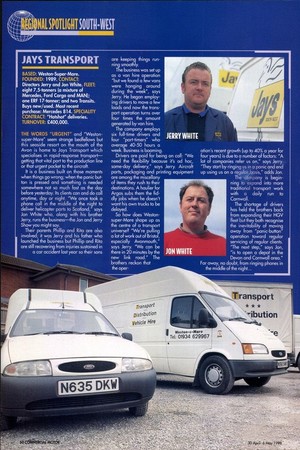
Page 52
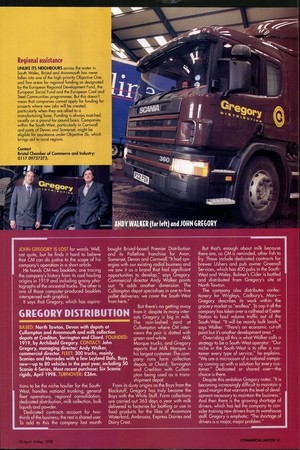
If you've noticed an error in this article please click here to report it so we can fix it.
on operators close to the printing, packaging and engineering centre of Bristol and Avonmouth. Patric Cunnane headed west through unseasonal snow and rain to find out how hauliers in this neck of the West Country are facing up to the Millennium.
He found that things ain't so bad, apart from a chronic shortage of drivers. He met an operator whose business grew 30% last year; another so busy that his "part-timers" work 50-hour weeks; and a 300-truck operator who couldn't believe /thouId cover all his activities in one small article. Then there was the company moving factory equipment that has just tucked into a nice meat-pie contract; the steel specialist bringing abnormal loads into London for a giant new cinema; and a man expanding his business even though he fears an autumn recession... WESTERN FREIGHTS BASED: Keynsham, Bristol. FOUNDED: 1954 by Audrey Drohan. CONTACT: Tim Drohan, managing director. FLEET: 45 vehicles—a mixture of Scanias and Mercedes—on contract hire. SPECIALITY CONTRACT: Shared-user grocery, paper and packaging distribution.
£6.5m. TIM DROHAN DOESN'T STRIKE YOU AS a particularly pessimistic person but he confidently predicts that a recession will start to bite later this year, as troubled Asian economies flood western markets with cheap exports and the strong pound sabotages British exports.
He reckons it's time to take shelter by cutting costs—not by shedding jobs but by improving his computer systems: "We bought a new system for integrating accounts," he explains, "Many of our customers enter data into our system and we want to ensure it's valid and does not require extra work." Drohan is an admirer of the skills developed by the grocery market, including con It's all about getting the information back to customers 'quickly and accurately so they can invoice their customers.
While Drohan philosophises about staying lean to survive, this doesn't rule out expansion. Eighteen months ago he bought a local haulier, HM Transport, along with its 16 vehicles. He retained its former owner, Steve Morgan, as Western Freight's transport director. "He's brought his skills to us," Drohan explains. The acquisition was designed to shift emphasis from being seen as "a warehousing company that does transport to a transport company that also offers warehousing". It's a subtle distinction, perhaps, but Drohan has built up a good part of his business by using his 10,000m 2 of warehousing to act as a food broker for importers. This operation helps offset the area's low manufacturing base, but it means that goods have to be received, stored and packaged, instead of simply collected from Factories and delivered to customers.
As part of his plans for becoming a transport operator of choice for the West Country, Drohan is developing alliances with other hauliers. For example, he works with Yorkshirebased Bedfords to distribute the Mail on Sunday magazine: "It's the way forward for independents to forge friendly alliances," he says.
Drohan sees a future in the West Country for astute hauliers because "the big boys are not interested". Like everyone else, however, he is finding it hard to find drivers—last year the national HGV intake was down by 50%—and he has been forced to pay higher wages to get good recruits. This was not the case when his mother, Audrey, launched the business in 1954. She was a remarkable woman. After a post-war stint at BRS, where she rose to become a regional manager, she left disgusted that she was earning less than her subordinates because she was a woman and went into business on her own, to be joined by her husband Tom two years later. Over the years the firm was a main carrier for John Harvey's Sherries—famous for its Bristol Cream—and Robertson's Jams. Both these companies have left Bristol and other work has had to be found.
Clearly Tim Drohan has learned from his parents' experiences that planning is essential for survival. On the day CM visits, a Friday, he begins to grow restless as our photographic session delays a departure. As he says: "I can't really tell Sainsbury at Yate that their delivery was late because I was having my photograph taken, can I?"
PETER MAUGHAN TRANSPORT BASED: Tetbury and Bristol. FOUNDED: 1977 as a limited company. CONTACT: Peter Maughan, managing director; Deborah Wilkey, office manager; Heather Draper, transport supervisor. FLEET: 14 Scania, Volvo and ERF artics. Buys used. Most recent purchase: Two L-reg Scania 93Ms. SPECIALITY CONTRACT: Transporting steel; abnormal loads. TURNOVER: £1.5m LONDON FILM BUFFS WHO VISIT the multi-screen cinema under construction in Waterloo will, in part, have Peter Maughan Transport to thank as they tuck into their popcorn and enjoy their movies. This West Country operator has just begun transporting abnormal loads of steel fabrications into the South London site and, as transport supervisor Heather Draper points out: "It's a difficult job because the loads are five metres wide."
But our visit is made worthwhile by meeting the entertaining double act of Deborah Wilkey and Heather Draper who share the day-to-day running of the business. Unfortunately for the plucky twosome CM has to take photographs come rain or shine: by the time we finish they're turning blue with cold. Never mind. Once back in the office and revived by mugs of tea, Wilkey and Draper explain what the business is about. Founder Peter Maughan is semi-retired and leaves them to get on with ensuring that clients are serviced. The loads are mainly industrial: steel fabrications; building materials; car parts to the Midlands; and plastics. They also have a client which exports ornamental stonework to the Continent. One of the company's largest customers, steel fabricator Bisons, shares its Tetbury site. Apart from the swanky new South London cinema, Bisons has contracts for several Tesco stores.
Draper remarks that the firm is signed up to the London Boroughs Transport Committee's night-time lorry ban which prevents deliveries before 08.00hrs: "However, we have permits for a few trucks to enter the capital before 07:00hrs when necessary." she says. Other regular destinations include Scotland and Cornwall, with Continental excursions to Belgium, Holland The business was formerly based in the Bristol suburb of Frampton Cotterell but moved to Tetbury when Peter Maughan bought John Pargeter, the transport company that used to be based on the Tetbury site. and Germany.
"Now we could be delivering to four building sites at a time," says Wilkey. "We are starting deliveries for another steel fabricator, Modern Engineering, tomorrow." The work is mostly spot hire but as Draper points out: "We know that we will be doing most of the work for Bisons, Modern Engineering, Auto Moulds and Precision Polymers." The nature of the work means it is often necessary to call on the support of other hauliers, and to offer support when the haulage boot is on the other foot. Do they ever worry that such incestuous relationships will lead to fellow hauliers pinching their clients? "No, no, no!" Draper exclaims. "People know who's working on what but I wouldn't dream of poaching anyone else's customer." The company is currently over-resourced with low-loaders after a client in agricultural machinery was taken over. "We have three lowloaders including one that we've bought quite recently. It was not such a wise investment," says Wilkey ruefully—unless CM readers in Gloucestershire know of any tractors that need delivering... We get on to the subject of drivers and recruitment difficulties. "Today's drivers don't want to do flat work when they can work for the likes of Bookers, which is opening a food distribution centre nearby," Wilkey explains. Another few minutes and we'll be reminiscing about the lost skills of roping, sheeting and handballing while the rain continues to sluice down, overflowing the puddles in the yard outside. DAVID HATHAWAY TRANSPORT BASED: Philips Marsh, Bristol. FOUNDED: 1980. CONTACT: David Hathaway, managing director; David Chivers, sales manager; Matt Hathaway, transport manager. FLEET: 18 trucks, mainly Scanias. Buys new. Most recent purchase: MAN 403, April 1998. Two MANs on order. SPECIALTY CONTRACT: Groupage, mainly packaging, print and building materials. TURNOVER: 0.5m. DAVID HATHAWAY IS AWAY when CM visits, enjoying a holiday in Las Vegas. Our resources don't stretch to a transatlantic flight so we concentrate our interviewing fire on David Chivers, the company's ebullient sales manager. Chivers explains that the firm was founded 18 years ago by his boss, delivering domestic coal. Hence the statue of a coalman, made out of coal, in the boardroom.
This room doubles as David Hathaway's office and play area as well, judging by the pinball machine in one corner. The business has long since shaken off the coal dust and now concentrates on nationwide groupage in the packaging, print and building materials sectors. It stays well clear of food, Chivers explains, because of the hassles encountered when delivering to supermarket distribution centres and the delays that everyone in that sector moans about.
Business has grown by 30% in the past year and is already up by £750,000 this year with around 500 pallets passing through the small city-centre warehouse every day. It's just as well the goods keep moving because there's little space for storage or parking. The staff have to cover the hours to make sure nothing stands still: the office opens at 06:00hrs and closes at 20:00hrs while the warehouse only closes between 02.00-04.00hrs.
Chivers reckons the company makes better profits than Eddie Stobart: "We are not the cheapest but we provide an excellent ser vice," he says.
Hathaway handles its own collections with three artics picking up from the Bristol area, Gloucestershire and Wiltshire. Does Chivers believe there are any particular factors in the economy which have contributed to the company's recent success? "No, it's down to hard work," he says firmly. "We take a lot of crap out of the marketplace—we will pick up the one, two or three-pallet loads." Although no customer is taken on without a credit check, Chivers does a lot of cold selling: "It's being able to talk and knowing what the company is about. I'm not a salesman who sells you a car without knowing how it works." The com y believes that it looks after its drivers by paying £310 a week for Class 1, which Chivers says is better than most operators in Bristol. "But we are not looking for the normal sort of driver," he adds. Wages have increased recently and to account for that, and other rising costs, Hathaway puts up its rates by 2-3% a year. "Looking after the drivers is a paramount concern for David Hathaway," says Chivers. "We spend a lot on uniforms—drivers are our ambassadors. We don't want them to look tatty when they deliver to our customers." But that's not the only reason, according to Chivers: "David's an excellent boss. He's there for the workers because he's been there and done it himself."
TRANSPORT The firm has the sort of expe ALLAN BADMAN BASED: Whitchurch, Bristol. FOUNDED: 1978. CONTACT: Allan Badman, proprietor. FLEET: Seven trucks (five Scanias and two Mercedes-Benz). Six have cranes, including equipment by Pesci and PMS. Buys new/used. Most recent purchase: Two-year-old Scania R113. SPECIALITY CONTRACT: Moving factory equipment, steel and portable buildings. TURNOVER: £500,000. IF YOU WANT TO FIND OUT what's happening in Bristol's economy, Allan Badman is a good man to talk to. His business, which specialises in moving heavy industrial equipment, is like the other side of a coin: "We are a mirror image of our customers," he says. A small fleet of lorry-loader trucks provides a service to manufacturers who want to move new equipment into a factory or relocate an existing factory. "Engineering has picked up because of new orders won by RollsRoyce at Patchway and British Aerospace at Filton," he notes. He also moves portable buildings and when that's going well—as it is at the moment—it's because there's life in the building trade. Running flats means he can also carry structured steel, pylon equipment and containers.
Badman works for contractors to the factories. It has just installed £700,000 of new machinery imported from Holland for pie maker Bowyers in Trowbridge. As Badman points out, the food sector enjoys more consistency than other areas. Supplying the building trade with portable buildings takes a downturn in the winter when weather is poor and sitework delayed. When weather picks up there is a glut of work.
ticularly suffered in Construction par the late eighties: "It caused a lot of havoc for us with people going to the wall and a few bills not being paid," reflects Badman. not get a job during a reces sion," he remarks.
rience that 'provides a nose for survival. Badman has been in business 20 years on his own but before 1978 he was in partnership with his cousin John Badman, who now runs a separate business.
That partnership began in 1965 and before that Allan worked in his father's outfit, EW Badman which was sold in the mid-sixties.
EW Badman was started in East Bristol by Allan Badman's grand father, delivering coal by horse and cart—the first lorry was a Model-T Ford. Allan's father joined in 1949 and built the business after denationalisation. It's an old story but one founded on the building blocks of survival. JAYS TRANSPORT BASED: Weston-Super-Mare. FOUNDED: 1989. CONTACT: Directors Jerry and Jon White. FLEET: eight 7.5-tonners (a mixture of Mercedes, Ford Cargo and MAN); one ERF 17-former; and two Transits. Buys new/used. Most recent purchase: Mercedes 814. SPECIALITY CONTRACT: "Hotshot" deliveries. TURNOVER: £400,000.
THE WORDS "URGENT' and "Westonsuper-Mare" seem strange bedfellows but this seaside resort on the mouth of the Avon is home to Jays Transport which specialises in rapid-response transport— getting that vital part to the production line or that urgent packet to the aircraft.
It is a business built on those moments when things go wrong; when the panic button is pressed and something is needed somewhere not so much fast as the day before yesterday. Its clients can and do call anytime, day or night. "We once took a phone call in the middle of the night to deliver helicopter parts to Scotland," says Jon White who, along with his brother Jerry, runs the business—the Jon and Jerry Show you might say. Their parents Phillip and Rita are also involved; it was Jerry and his father who launched the business but Phillip and Rita are still recovering from injuries sustained in a car accident last year so their sons are keeping things run ning smoothly.
The business was set up as a van hire operation "but we found a few vans were hanging around during the week", says Jerry. He began employ ing drivers to move a few loads and now the trans port operation turns over four times the amount generated by van hire. The company employs six full-time drivers and JERRY Will four "part-timers" who average 40-50 hours a week. Business is booming. Drivers are paid for being on call: "We need the flexibility because it's ad hoc, same-day delivery," says Jerry. Aircraft parts, packaging and printing equipment are among the miscellany of items they rush to their destinations. A haulier for Argos subs them the fiddly jobs when he doesn't want his own trucks to be delayed.
So how does Westonsuper-Mare shape up as the centre of a transport universe? "We're pulling a lot of work out of Bristol, especially Avonmouth," says Jerry. "We can be there in 20 minutes by the JON WIllIE new link road." The brothers reckon that the oper ation's recent growth (up to 40% a year for four years) is due to a number of factors: "A lot of companies refer us on," says Jerry. "They start by ringing us in a panic and end up using us on a regular basis," adds Jon. The c:timpany is beginning to expand into more traditional transport work with a daily run to Cornwall.
The shortage of drivers has held the brothers back from expanding their HGV fleet but they both recognise the inevitability of moving away from "panic-button" operation toward regular servicing of regular clients. "The next step," says Jon, "is to open a depot in the Devon and Cornwall area." Far away, no doubt, from ringing phones in the middle of the night... Regional assistance UNLIKE ITS NEIGHBOURS across the water in South Wales, Bristol and Avonmouth has never fallen into one of the high-priority Objective One and Two areas for regional funding as designated by the European Regional Development Fund, the European Social Fund and the European Coal and Steel Communities programmes. But this doesn't mean that companies cannot apply for funding for projects where new jobs will be created, particularly when they are allied to a manufacturing base. Funding is always matched; usually on a pound-for-pound basis. Companies within the South-West, particularly in Cornwall and parts of Devon and Somerset, might be eligible for assistance under Objective 5b, which brings aid to rural regions.
Contact Bristol Chamber of Commerce and Industry: 0117 09737373.
GREGORY DISTRIBUTION BASED: North Tawton, Devon with depots at Cullompton and Avonmouth and milk collection depots at Crediton, Torrington and Chard. FOUNDED: 1919, by Archibald Gregory. CONTACT: John Gregory, managing director; Andy Walker, commercial director. FLEET: 300 trucks, mainly Scanias and Mercedes with a few Leyland Dafs. Buys new—up to 80 vehicles in the past year, including 50 Scania 4-Series. Most recent purchase: Six Scania rigids, April 1998. TURNOVER: £36m. JOHN GREGORY IS LOST for words. Well, not quite, but he finds it hard to believe that CM can do justice to the scope of his company's operation in a short article. He hands CM two booklets; one tracing the company's history from its coal hauling origins in 1919 and including grainy photographs of the ancestral trucks. The other is one of those computer-produced booklets interspersed with graphics. It says that Gregory, which has aspira tions to be the niche haulier for the SouthWest, handles national trunking, general fleet operations, regional consolidation, dedicated distribution, milk collection, bulk liquids and powder. Dedicated contracts account for twothirds of the business; the rest is shared user. To add to this the company last month bought Bristol-based Premier Distribution and its Palletline franchise for Avon, Somerset, Devon and Cornwall."It had synergies with our existing radial business and we saw it as a brand that had significant opportunities to develop," says Gregory. Commercial director Andy Walker points out: "It adds another 'dimension. The Cullompton depot specialises in one-to-five pallet deliveries, we cover the South-West from here."
But there's no getting away from it: despite its many interests Gregory is big in milk. The rain-lashed yard at Cullompton where CM interviews the pair is dotted with green-and-white Milk Marque trucks, and Gregory reports that Milk Marque is his largest customer. The company runs farm collection depots at Chard, Torrington and Crediton with Cullompton being used as a transshipment depot.
From its dusty origins as the Boys from the Blackstuff, Gregory has truly become the Boys with the White Stuff. Farm collections are carried out 365 days a year with milk delivered to factories for bottling or use in food products for the likes of Avonmore Waterford, Ambrosia, Express Dairies and Dairy Crest. But that's enough about milk because there are, as CM is reminded, other fish to fry. These include dedicated contracts for brewer Ushers and pub owner Greenall Services, which has 400 pubs in the SouthWest and Wales. Bulmer's Cider is bottled and distributed from Gregory's site at North Tawton.
The company also distributes confectionery for Wrigleys, Cadbury's, Mars— Gregory describes its work within the grocery market as "endless". To cap it all the company has taken over a railhead at Exeter Station to haul volume traffic out of the South-West. "It will be mainly bulk loads," says Walker. "There's an economic cut-off point but it's another development area." Overriding all this is what Walker calls a strategy to be a South-West operator. "Our niche in the South-West is to offer a customer every type of service," he explains. "We are a microcosm of a national company coming up with a solution for every customer." Dedicated or shared user—the choice is there.
Despite this ambition Gregory notes: "It is becoming increasingly difficult to maintain a good margin that warrants the level of development necessary to maintain the business." And then there is the growing shortage of drivers, which has led the company to consider training new drivers from its warehouse staff. Gregory is emphatic: "The shortage of drivers is a major, major problem."























































































































